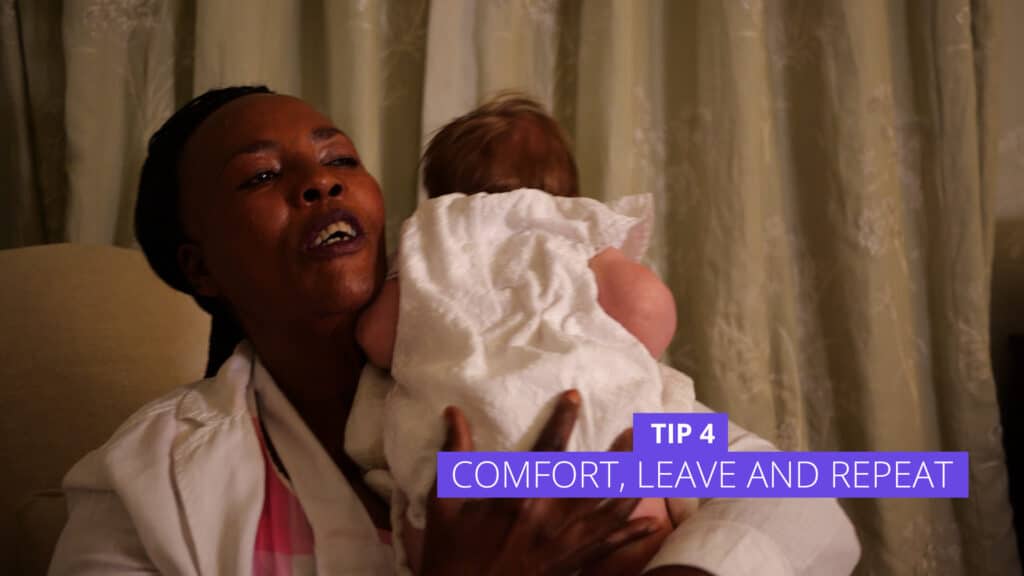Many people assume if your baby is up and busy all day, they will sleep well at night – this is not always the case. The baby is usually so over tired and over stimulated, that they have difficulty settling at night.

Your Night Nanny will advise on giving structured sleeps and feeds in the day, this will make your baby more content and therefore sleep better at night.
- Do not expect your baby to sleep through the night until they are established on solids at around 6 months old or above. Their tummy is too small to go more than 4/5 hours without food, unless they do so naturally, but it is unusual. Once your baby is over 6 months old, on solids and the correct weight then one of our Night Nannies Sleep Consultants can start guiding them to sleep through the night.
- The Night Nanny will not withhold feeds from a baby who needs them but she will be able to recognise what is hunger and what is comfort and respond accordingly.
- Your Night Nannies Sleep Trainer will help you choose a suitable approach.
You may consider a number of things:
Like keeping your baby awake after 3 or 4 pm so they go down well at bedtime around 7pm.
Creating a simple and consistent bedtime routine: This helps your baby recognise the cues for sleep time.

- A short warm bath
- A light baby massage
- A simple book
- A last feed
- A song/cuddle and then into cot

Make sure your baby feeds well before bed and doesn’t fall asleep during the feed.
You can do this by:
Changing their nappy
Tickle their feet
Unwrap them and cool them down
No feed should last longer than one hour
A calm sleep environment

Make sure this is nothing stimulating in their cot like a musical mobile at night, this could distract them from sleeping.
- Make sure your baby’s room is darkened. Invest in some black out blinds, these are useful for keeping early morning rays out.
Guide your baby to self settle: Try from the start to put your baby down in his cot AWAKE, so he gets used to going to sleep on his own. Don’t get into the habit of rocking your baby to sleep – you may be there for hours!

The minute your baby cries it is tempting to rush over to the cot and pick him up. Try not to – try this:
Wait a few moments and see if he/she will settle themselves back to sleep.
If he doesn’t settle then try patting and singing to him in his cot for a few minutes.

If you cannot settle him and his crying is urgent then pick him up and comfort him but then put him back in his cot, soothe him and leave the room, even if he is crying and see if he will settle after a few minutes.
If he doesn’t go to sleep then leave him to cry for 3 or 4 minutes and then go back in and repeat the process. Pick him up, wind him and then put him in the cot and soothe him. Then leave the room or stand at the back of the room.
Then wait 4 to 5 minutes and if he is still crying – repeat the process. You can try leaving him a little longer each time but never more than 10 minutes.
The elastic band method is where you leave a baby to cry for a set length of time like 3 mins or 5 minutes and go back each time until he is sleeping.
The key is not to withhold feeds from a baby who still needs them, but to recognise what is hunger and what is comfort and respond accordingly:
If they are waking in the night for a feed they don’t need:
Instead of giving your baby milk when he wakes in the night, try cooled boiled water.
If that does not work, water down their milk e.g. 2 scoops to 6 ounces of water. The idea is to make it not so tasty so the baby will not bother to wake in the night for it and encourage him to take all the milk and solids he needs during the day.
Or you could just soothe and pat your baby back to sleep without anything. This may take a long time if the baby is used to milk.
Remember, whatever approach you use, be consistent, it is hard to break habits and may take 1 to 2 weeks.
If they are waking by early morning light then buy blackout blinds.

